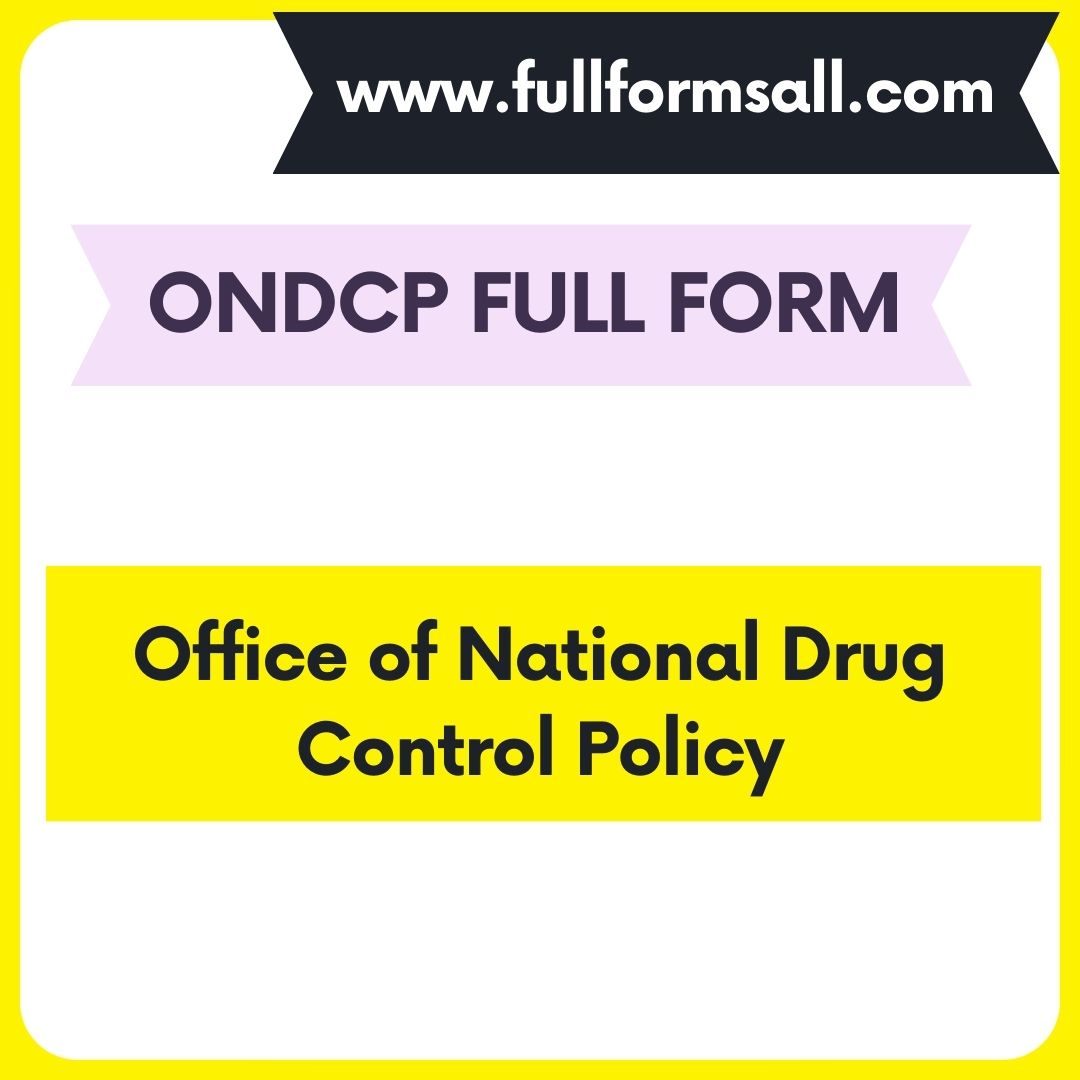In this article you get to know about ONDCP full from and other different abbreviations of ONDCP in various fields. ONDCP full form refers to Office of National Drug Control Policy.
The Office of National Drug Control Policy, often abbreviated as ONDCP, is an executive branch office within the U.S. federal government. It was established by the Anti-Drug Abuse Act of 1988 and is commonly known as the “Drug Czar’s office.” The ONDCP is tasked with coordinating and overseeing the nation’s drug control efforts, ensuring a unified approach across various federal agencies.
The Role of ONDCP
Policy Development and Coordination:
The ONDCP plays a central role in developing and coordinating the National Drug Control Strategy (NDCS), which outlines the federal government’s approach to addressing drug-related issues. This strategy sets priorities and allocates resources to various drug control programs.
Budget Oversight:
ONDCP is responsible for managing the federal drug control budget, ensuring that resources are allocated efficiently to support prevention, treatment, enforcement, and research efforts.
Interagency Collaboration:
ONDCP collaborates with numerous federal agencies, including the Department of Health and Human Services (HHS), the Drug Enforcement Administration (DEA), and the Substance Abuse and Mental Health Services Administration (SAMHSA). These collaborations aim to implement and monitor drug control policies and initiatives effectively.
Promotion of Evidence-Based Practices:
The ONDCP works to promote evidence-based prevention and treatment programs, ensuring that resources are directed toward approaches that have demonstrated effectiveness in reducing substance abuse and its consequences.
International Cooperation:
ONDCP engages in international efforts to combat drug trafficking and production. This includes cooperation with other nations to address the global drug trade.
The Significance of ONDCP
Coordinated Response:
Drug-related issues are multifaceted, involving public health, law enforcement, and social services. ONDCP’s role in coordinating these efforts ensures a more cohesive and effective response to the challenges of substance abuse.
Resource Allocation:
By managing the federal drug control budget, ONDCP can direct resources where they are most needed, prioritizing prevention, treatment, and harm reduction programs.
Data-Driven Decision-Making:
ONDCP relies on data and research to inform drug control policies and strategies. This evidence-based approach helps ensure that initiatives are tailored to address specific drug-related problems.
Public Awareness:
ONDCP plays a vital role in raising public awareness about the dangers of drug abuse and the importance of prevention and treatment. Public education campaigns aim to reduce drug use and its associated harms.
The National Drug Control Strategy
The cornerstone of ONDCP’s work is the National Drug Control Strategy (NDCS). This comprehensive plan outlines the federal government’s approach to drug control and includes the following key components:
Prevention:
Prevention efforts aim to stop substance abuse before it starts. The NDCS emphasizes the importance of evidence-based prevention programs in schools, communities, and workplaces.
Treatment and Recovery:
The strategy highlights the need for accessible and effective treatment options for individuals struggling with substance abuse disorders. It promotes the expansion of treatment and recovery support services.
Reducing Drug Availability:
ONDCP focuses on reducing the availability of illegal drugs through law enforcement efforts, interdiction, and international cooperation.
Health and Safety:
The NDCS prioritizes public health and safety, emphasizing harm reduction strategies and initiatives to address the opioid crisis, such as naloxone distribution and medication-assisted treatment.
Research and Data Analysis:
Data collection and research are essential components of the NDCS. This information helps assess the impact of drug control policies and informs future strategies.
Challenges Faced by ONDCP
Evolving Drug Landscape:
The drug landscape in the United States is constantly changing, with new synthetic drugs and emerging trends. Keeping up with these developments is a considerable challenge.
Resource Constraints:
The budget allocated to drug control efforts may not always align with the scale of the problem. Adequate funding is essential to implement comprehensive prevention, treatment, and enforcement strategies.
Treatment Accessibility:
Ensuring that individuals have access to timely and effective treatment remains a challenge. This includes addressing barriers such as stigma and the shortage of treatment providers.
Racial Disparities:
Drug policies have historically had a disproportionate impact on minority communities. Addressing racial disparities in drug enforcement and sentencing is a complex and ongoing challenge.
Prescription Drug Abuse:
The misuse of prescription drugs, including opioids, is a pressing issue. ONDCP must adapt to combat this specific problem effectively.
The Future of ONDCP
Holistic Approach:
ONDCP may increasingly emphasize a holistic approach that addresses the root causes of substance abuse, including social determinants of health and economic disparities.
Treatment Expansion:
Expanding access to treatment and recovery support services, especially in rural and underserved areas, will likely remain a priority.
Harm Reduction:
Harm reduction strategies, such as supervised injection sites and syringe exchange programs, may gain more attention as ways to reduce overdose deaths and health risks associated with drug use.
Technology and Data Analytics:
Advancements in technology and data analytics can enhance the monitoring and evaluation of drug control initiatives. ONDCP may increasingly harness data-driven insights to target resources more effectively and identify emerging drug trends.
Mental Health Integration:
Recognizing the strong connection between substance abuse and mental health, ONDCP may collaborate more closely with mental health organizations to provide integrated care for individuals with co-occurring disorders.
Racial Equity:
Addressing racial disparities in drug enforcement will remain a priority. ONDCP may work to reform policies and practices that disproportionately impact minority communities.
Different abbreviations of ONDCP in various fields are as follows
| Term | Abbreviation | Category |
| ONDCP | Office of National Drug Control Policy | Academic & Science |
| ONDCP | Online National Diploma in Child Psychology | Education |
| ONDCP | Optical Network Design and Configuration Protocol | Technology |
| ONDCP | Ontario Native Drums and Culture Project | Others |
| ONDCP | Ocean Network and Data Centre Project | Others |
| ONDCP | Opioid Narcotics Detoxification & Control Program | Others |
CONCLUSION:
Dear reader in this article you get to know about ONDCP full from and ONDCP term used in various other fields, If you have any query regarding this article kindly comment below.

